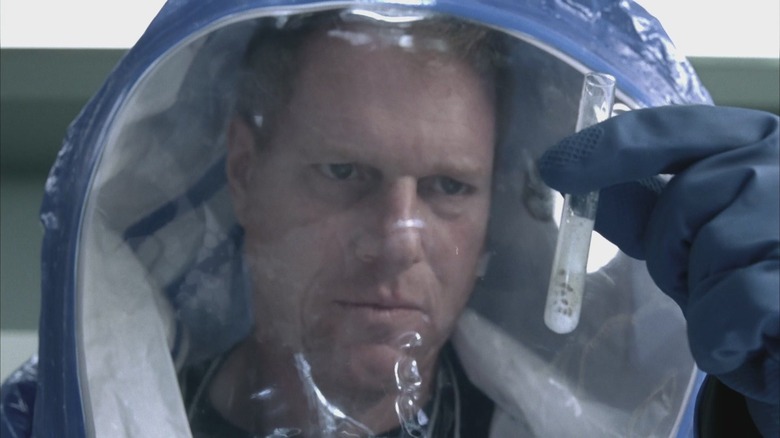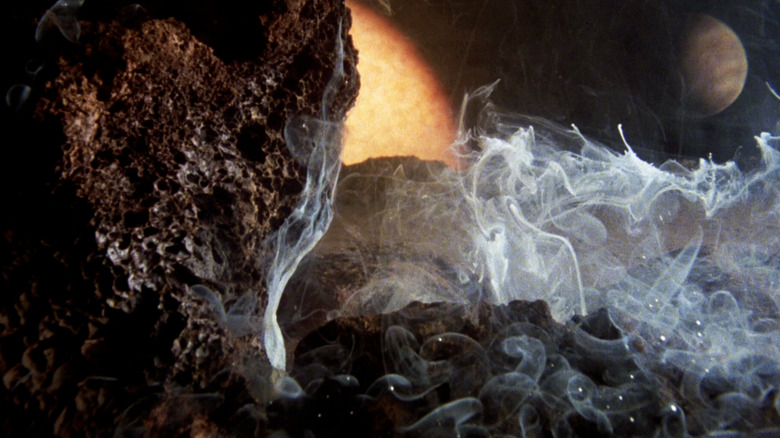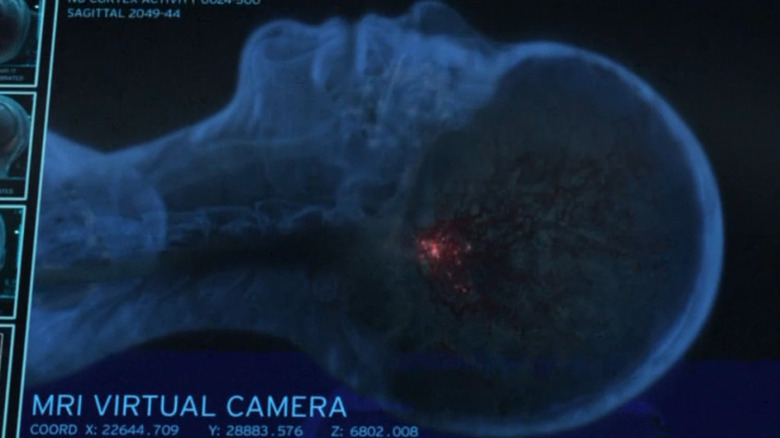
What caused the zombie outbreak in "The Walking Dead"? It's a mystery almost 20 years old and neither the original comic nor the plethora of spin-off material, including the recently concluded AMC series, have been forthcoming.
For starters, what is known? The root cause is a virus that infects the brain and, after death, reanimates the body. The TV series ultimately provided more clarity on the mechanics than the comic. In "TS-19," the season 1 finale, CDC researcher Dr. Edwin Jenner (Noah Emmerich) compared the disease to meningitis. He also explained that the virus only infects the brain stem, which is why a dead person's personality and memories aren't restored, nor can a zombie form new ones.
The characters initially assumed the virus is transmitted through a zombie biting someone, but it turns out the virus is actually airborne. Even the living are infected. Someone who's bitten dies from the resulting infection, then the dormant virus activates. Unless you amputate a bitten limb or damage the corpse's brain, anyone who dies returns as a zombie.
Some writers would be tempted to make an active mystery of the disease: where did it come from? Can it be cured? If so, how? "Walking Dead" creator Robert Kirkman is not one of those writers. While he's occasionally offered some hints or jokes, the series itself is always focused on the micro world of the characters and how they survive — if not quite thrive — in a radically altered world.
It Came From Outer Space

It'd be hard to guess from the series itself, but outer space has cast a shadow over "The Walking Dead" since the beginning. Kirkman's pitch to Image Comics doesn't resemble the final product at all. As he recounted at San Diego Comic-Con 2018:
"I pitched 'The Walking Dead' and he said there's no successful zombie books in this industry and you need to have a hook. Your book needs to be about something ... You can't just do a book about the zombie apocalypse and people are surviving ... and I said, 'Oh, we got that, there's an alien invasion and the aliens are just using the zombies to weaken the world's infrastructure and move in ...' And he was like, 'That sounds cool!' and it got approved. I was lying."
The closest Kirkman came to implementing this "alien invasion" was a joke ending of issue #75, later followed by the non-canon mini-series "Rick Grimes 2000."
"The Walking Dead" ended in 2019 with issue #193 without ever explaining the virus' origin. Then in 2020, Kirkman seemingly answered the question with a now-deleted Tweet: "Space spore." He later backtracked, claiming this was a joke. Yet, this explanation would be strangle fitting. It would explain the logistics of how quickly the virus spread: Earth was blanketed in the spore. It would also account for the unearthly virus in a more grounded way than an outright alien invasion.
An extraterrestrial origin even has precedent in the genre. Space spores infecting humans is right out of "Invasion of the Body Snatchers," especially the 1978 version which opens with the spores reaching Earth. Kirkman's pitch, aliens softening up humanity with zombies, was even cribbed from "Plan 9 From Outer Space."
Then there's George Romero, the godfather of the zombie genre and Kirkman's primary influence. His later films leaned more towards the supernatural (take "Dawn of the Dead" — "When there's no more room in Hell, the dead will walk the Earth"). However, in the original "Night of the Living Dead," the zombies are hinted to have been created by radiation from a crashed space probe.
The French's Fault

The TV version of "The Walking Dead" has always been a different take story than the comic. While the original series ended without the virus' source revealed, spin-off series "The World Beyond" offered a clue.
The season 2 series finale, "The Last Light," featured a post-credits scene set in France. An unnamed woman (Carey Van Driest) enters an abandoned lab named la Biomédicine DDMI. On a laptop, she watches a pre-recorded message from Jenner before a man enters holding a gun. From their conversation and some nearby graffiti, "Les morts sont nes ici," ("the dead were born here"), it's implied this lab is the source of the virus.
Did the French researchers merely stumble upon their creation or was it deliberately engineered as a bio-weapon? Likewise, was it accidentally or deliberately released? The upcoming Daryl Dixon spin-off will be set in France, so if any of the spin-offs answer these questions, it'll probably be that one.
Why Kirkman Says This Doesn't Matter

While the TV universe may be going a different route, Kirkman feels that the virus' origin simply wasn't important to the story he wanted to tell. In a 2018 Tumblr Q&A, he said that he does have the origin determined, but it wouldn't make sense to reveal it in the comic:
"It couldn't be less important to the story and the lives of these characters. It would be completely out of place in the story. Honestly, if a scientist from Washington came to the character[s] and told them what happened the characters would just shrug and say 'Oh ... okay ...' it wouldn't change their lives at all."
What's important is how the apocalypse affects the people living in it. That's true for Kirkman's comics as well as Romero's zombie films. "Night" and "Dawn" are about, respectively, how neither racism nor consumerism ends even when the world has. Even in "Day of the Dead," where the leads are scientists and military officers trying to reverse the virus, the story is about the internal breakdown of the group.
In real life and stories, people want there to be a tangible bad guy because that brings a sense of order. It's better, however, to take "The Walking Dead" as what the story is on its face: a new disease appeared, the world changed forever, and here's how people lived through that change.
Read this next: 14 Horror Movie Flops That Became Cult Classics
The post The Origin Of The Walking Dead Virus Explained And Why It Doesn't Matter appeared first on /Film.
